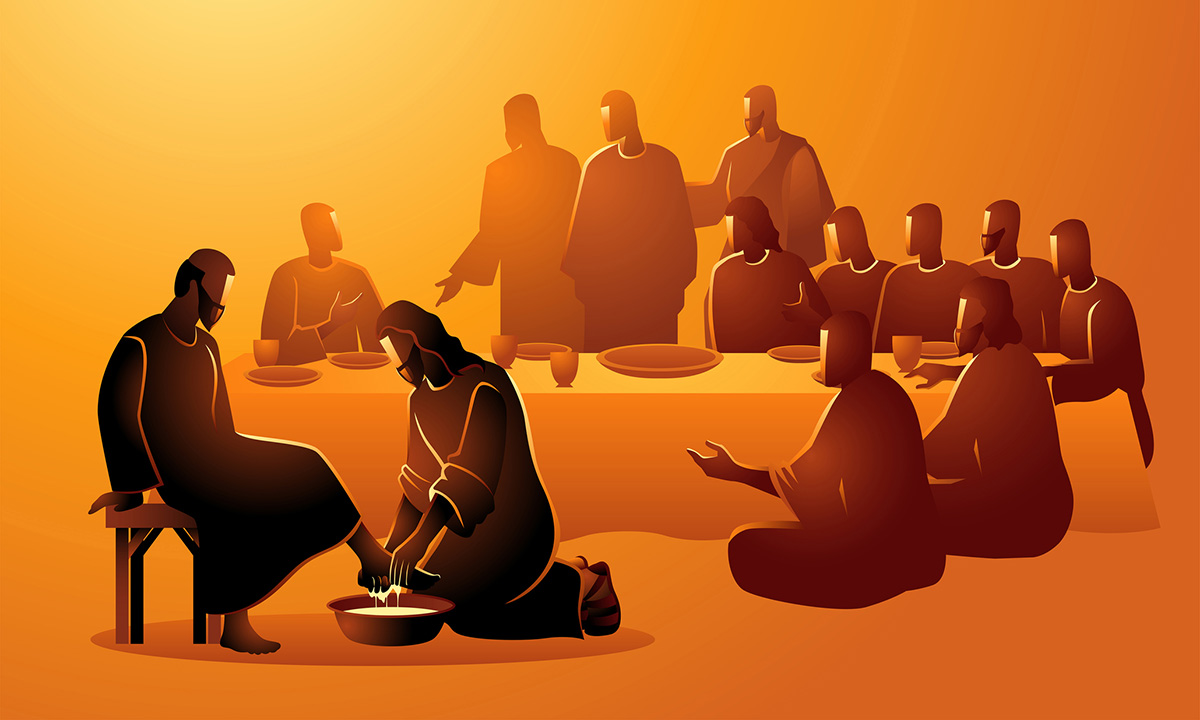
“Just as I have loved you, you also are to love one another.” (John 13:34)
By Rev. Dr. Aaron Moldenhauer
Jesus knew that his hour had come. It was time to depart from this world to the Father. About to depart, Jesus loved his own to the end. He tied a towel around his waist, poured water into a basin, and washed the disciples’ feet. The evening before he was crucified, he humbled himself to serve them; he knelt to scrub the grime of the road from the heels and insoles of the disciples. Lowly service from our humble Savior.
Such lowly service was an act of love. Jesus did this as an example for us: “If I then, your Lord and Teacher, have washed your feet, you also ought to wash one another’s feet. Truly, truly, I say to you, a servant is not greater than his master, nor is a messenger greater than the one who sent him” (John 13:14–16). A little later, Jesus said, “A new commandment I give to you, that you love one another: just as I have loved you, you also are to love one another. By this all people will know that you are my disciples, if you have love for one another” (John 13:34–35).
Love as Jesus loved
A new commandment—this new commandment gives “Maundy” Thursday its name.1 We hear this commandment to follow Jesus’ example in the context of Jesus scrubbing dirt from the toenails of his disciples. Hearing this word of God, we ought to reflect: Have we loved one another as Jesus has loved us? Have we served one another in love as Jesus has served us in love? Do our words and actions reflect a heart that knows we are not greater than Jesus, our Master and Lord? The sinful pride that lives within our hearts has led us to the opposite. We have placed ourselves first and demanded that others serve us. We have forgotten the example of Jesus and counted ourselves above getting down on our knees to wash feet—or whatever the equivalent service for the neighbor in your life is. We demand that others give to us, rather than obeying Jesus’ command to love them as he has first loved us.
“Just as I have loved you, you also are to love one another.” Our sin, our pride, our failure to keep this commandment reveals our need to gather anew around God’s Word and his Sacrament. On Maundy Thursday, we gather with the church to confess that we have sinned. We gather to cast pride out of our heart and to humble ourselves as Jesus humbled himself. We come to church with the prayer that God send his Spirit into our hearts by his Word. And we pray that his Spirit lead us to count others as better than ourselves, to lead a life of loving service for others rather than selfishly demanding that others serve us. We pray forgiveness for our sin.
But we gather for more. We come at Jesus’ invitation to marvel anew at the love our Lord shows to us. He came not to be served, but to serve, and to give his life as a ransom for many. In the upper room he gave us the meal of Communion to grant us his body and blood for our forgiveness, life, and salvation. We gather now to receive this rich meal. We gather to receive the Lord’s gift of forgiveness proclaimed through the pastor, extended through his Word, and distributed in the sacrament. Jesus left the upper room on Maundy Thursday to be betrayed into the hands of wicked men, to be condemned, crucified, and killed. He did that for you, that you might be forgiven and share in his eternal life.
Be doers of God’s Word
This kind of love leaves no room for bystanders or spectators. Maundy Thursday is not a day to stand by and watch Jesus from a distance. It is a day to hear his word, take it to heart, and do it. A day to confess our sin and receive his gift of forgiveness through word, absolution, and meal. A day to trust his promise: “If you know these things, blessed are you if you do them” (John 13:17). Blessed are you when you humble yourself; blessed are you when you take up the towel, tie it around your waist, and kneel to wash the feet of others. Blessed are you, cleansed and forgiven by the blood of this humble, serving Savior. Blessed are you as the Lord conforms you to the image of Christ by leading you to love and serve those around you.
We gather Maundy Thursday in reverent and somber services, standing in awe of the sacrificial love of our Savior. Many of these services end in darkness and silence, recalling our Lord’s betrayal in the Garden. The Maundy Thursday service leads us into the trial, crucifixion, and death of Jesus on Good Friday. And beyond—for this service leads us through the darkness of Good Friday and the silence of the tomb to the eternal light and life and joy of Easter.
May this hope won by your Savior, Jesus, fill you with love that you may hear and do Jesus’ command: “Just as I have loved you, you also are to love one another.”
1. “Maundy” comes from the Latin verb mandare, to command or order.

Rev. Dr. Aaron Moldenhauer is Vice President for Mission and Church Relations at Concordia University Wisconsin and Ann Arbor
Want in?
Concordia University Wisconsin is a Lutheran higher education community committed to helping students develop in mind, body, and spirit for service to Christ in the Church and the world. To learn more about Christian life at CUW, click the link below.